Noah Galloway’s battle to overcome depression has turned him into a fitness guru, a star performer, and a motivational speaker.
Like many of the millions who watched Noah Galloway’s performances on ABC’s Dancing with the Stars, I was moved by his natural grace, strength, manliness, and humility. He did not hide his prosthetic leg or residual arm but showed the world that he is still his essential self – a man who has honed his physical strength and his body into a thing of beauty – like a Greek classical sculpture adorned with meaningful tattoos that reflect his life story.
Galloway, of course, would laugh at such a comparison. “I’m a little mixture of Forrest Gump and Joe Dirt,” he said when we spoke in June not long after the Dancing with the Stars finale that had wowed the judges and audiences alike and put him and his dance partner Sharna Burgess into a third place finish.
Now 33, Galloway dropped out of college and joined the armed forces following 9/11, and had his first deployment to Iraq with the 101st Airborne in 2003. He loved the military life. A fitness fanatic who as a teenager realized “girls like fit guys,” Galloway was one of the strongest soldiers in his unit until that night when a roadside bomb took out the Humvee he was driving.
He woke up on Christmas Day 2005 in Walter Reed hospital, his left arm amputated above the elbow, and his left leg gone above the knee and his broken jaw wired shut. What pained him most, the former sergeant said, was that the career in the military that he had loved was over.
Back home in Birmingham, Alabama, the soldier closed himself off, stopped going out. The “pity party” dogged him for five years and contributed to the breakup of his second marriage. Looking back, Galloway said, “We rushed into getting married; she had just come out of a lot in her own life and I had just been injured. We thought we were going to be this positive thing for each other but my depression made it hard.”
Motivated by the desire to be a better father to his three children, Galloway began his own version of basic training and it saved him. With no book or manual to show him how a man missing an arm and a leg should go about getting fit, he developed a unique way of working out, and joined a group of veterans involved in endurance racing, competing in hardcore 10 – 12-mile-long races over military-style obstacle courses called Tough Mudders.
Galloway cuts a dashing figure when he races, wearing a kilt both for the ease of movement it affords, and to honor his Scottish and Irish ancestry.
Men’s Health named the amputee their Ultimate Man, putting him on the cover of the November 2014 issue. Guest appearances on television, including The Ellen DeGeneres show and The Today Show were followed by an invitation to take part in season 20 of Dancing with the Stars.
In typical Galloway fashion, he took on the ultimate test and loved it. Never mind the physical limitations, the guy had never danced. Manning up, he faced the challenge like a soldier on a mission.
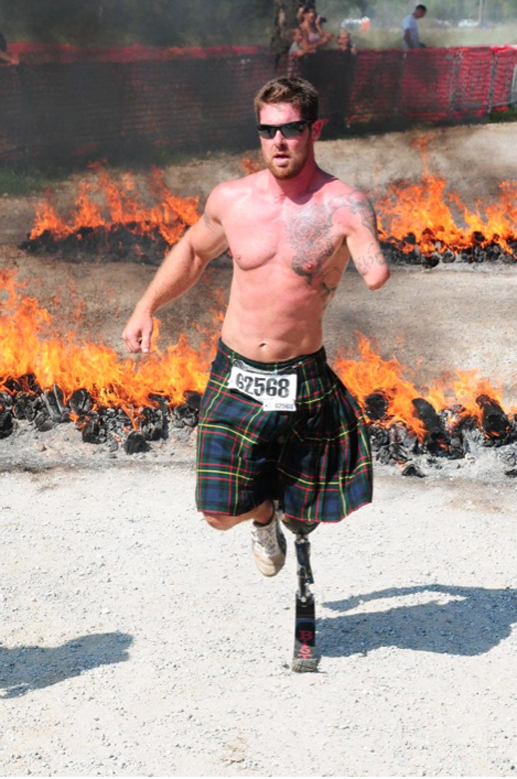
Over several weeks, Galloway mastered the dance routines, the cha-cha, samba and Argentine tango, and sent nine other competitors packing. In the process he won hearts and changed the way people view those who on first sight appear to be physically disabled.
Galloway was happy to be underestimated. In his last dance, he and his partner Sharna performed a freestyle number to Toby Keith’s “American Soldier,” which mapped out the story of Galloway’s life. It was, he said, “the journey of acceptance from the man I was, to the man I have become.”
The dance culminated in a transcendent moment when all the hard work and talent came together and Galloway, reaching beyond the limits of the possible, hoisted his partner into the air in a one-armed lift.
The audience rose to their feet and the cameras panned to Noah’s parents, and back to Galloway who stood with head slightly bowed, his hand over his heart, a soldier who had given it his all, completed his mission and proved that hard work and determination can overcome major obstacles.
The pair received a perfect score from the judges and a third place finish.
Galloway, who was never in it to win it, had in his own way won. “They were always trying to get me to say on camera, “I want to win, I want this,” but I would say, ‘No,’ I’m doing this to challenge myself.”
Rumer Willis walked off with the coveted mirror ball trophy, but Galloway left the show with a fiancée. He proposed to his girlfriend Jamie Boyd on air and she accepted.
Even before Dancing with the Stars, Galloway had become a sought-after speaker and fitness trainer. His foundation “No Excuses” focuses on encouraging children and veterans to lead a healthy life.
Having lived such an inspiring life, it’s no surprise that next up for Galloway is a book, “So maybe people can get a better concept of why I am the way I am.”
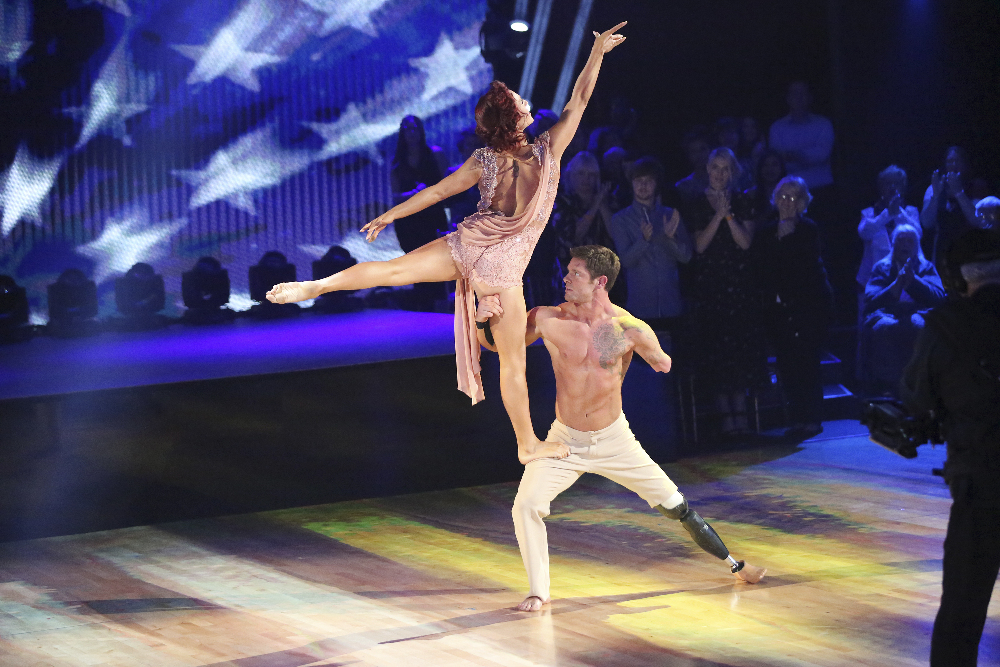
℘℘℘
How is all of this fame affecting you? Will you continue to live in Alabama?
Yes. I love to travel, but Birmingham is home, this is where my family is. And in terms of how am I dealing with all the new attention, I absolutely love it. I love to talk, and I love to talk about myself. The fact that people want to hear my story means so much to me.
What was the biggest challenge you faced on Dancing with the Stars?
I’m a perfectionist. Sharna, my dance-partner, was constantly saying stuff like, “nobody’s expecting you to be this amazing dancer. It’s a reality show.” But I wanted to be the best I could be, and I was very hard on myself and it was draining. And of course, the fact that I was missing an arm and a leg was a challenge, not just for me, but also for Sharna who choreographed all the dances. My center of gravity is more to the right because my body tends to let my right leg do everything, so there were certain times when we would be doing something and she didn’t understand why my body was shifted to one side. And then she realized my prosthetic leg would not hold me. If it bends, it goes, so I can’t lean into it. So we would see what I could do, and each week she added a little more content to the dances.
Considering it’s been almost 10 years since I’ve been injured and all the fitness I do and the races I’ve run, my balance has improved over time. But Sharna working with me on dance made me move better on my prosthetic leg and in my daily life.
The dance you did for the finale to Toby Keith’s song “American Soldier” was based on your life story. How emotional was that for you?
The week going into it, I wasn’t showing a lot of emotion, I was just learning the movements. All I was thinking about is “you have to learn the dance.”
But during the performance a lot of different emotions hit me. When I picked Sharna up over my head with one arm, and that was a move that’s never been done on the show before, I heard the crowd jump to their feet and cheer. And it made me feel so good, and when we finished and walked over to the judges and everyone gave us a standing ovation, it was very emotional and so sweet to see the reaction of everyone.
Why did you enlist? Is there a history of military service in your family?
My family, especially my mom’s side, has a very strong military history. My grandfather actually changed his birth certificate when he was 15 to join the military. So he went to WWII, Korea, and Vietnam. And my grandmother’s brother was killed in action as a paratrooper in WWII. My mom’s brother Johnny was a paratrooper in Vietnam. And I have a cousin who is the same age as me who is in the Marines.
But I never wanted to join the military. I talked to recruiters a couple of times, but I never cared that much. I ended up going to college and started the same semester as 9/11, and watching that moment on television, that’s when I decided to go in. I went in as an infantry soldier and went to jump school and ended up in the 101st Airborne, and we were right up front. And on the first deployment to Iraq I fell in love with the job. And even at Fort Campbell, I realized I did fit in with the military. I loved the deployments. I didn’t care where it was, how dangerous it was, I just wanted to be deployed. What was the hardest, besides losing an arm and leg, the big thing that really hurt me when I woke up that Christmas day after I was injured, was that a career I had just found was snatched away from me. The military said I could stay in, but I couldn’t be a front line infantry soldier and couldn’t be deployed anymore, so I got out.
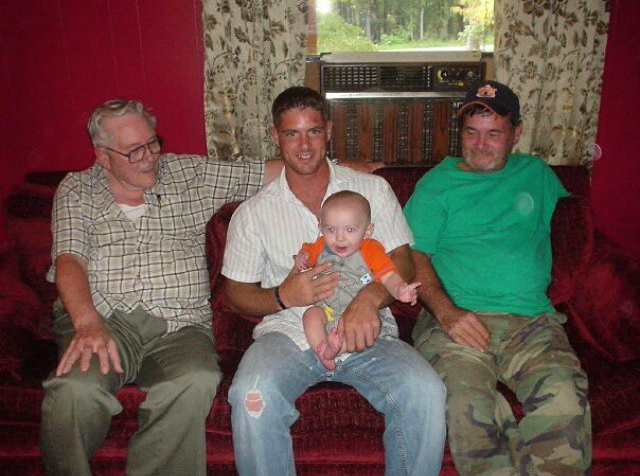
What was your experience on the ground in Iraq?
People have heard this from other soldiers, when you get over there, politics back home in the States don’t matter. What’s going on doesn’t matter. It’s all about survival and taking care of your buddies. And you get to know the locals. I never lived in a camp, we lived out with the locals on those deployments. And I loved that. Yeah, it’s more dangerous, but you get to know the people and try to learn the language. I never had a chance to travel before, and I had the excitement of the danger and the joy of experiencing a completely different culture and lifestyle.
Do you hold a grudge against the Iraqi who planted the bomb?
No. Even when I was going through my depression, I didn’t really have that kind of anger. I feel like you are a good soldier if you can look beyond what’s happening. To understand your enemy, you have to respect him. I was hit by a roadside bomb, and I’ve had people say to me that it is a crappy way for them to attack us. I know it sucks, but it’s an effective way [for them to fight us], so keeping that understanding kept me from having any anger towards them.
In the American Revolution, the British said that us Americans weren’t fighting fair because we did not line up in a field shooting. We did not have the means to battle the British army that way. So we hid behind trees and camped out inside barns and were taking pot shots at them.
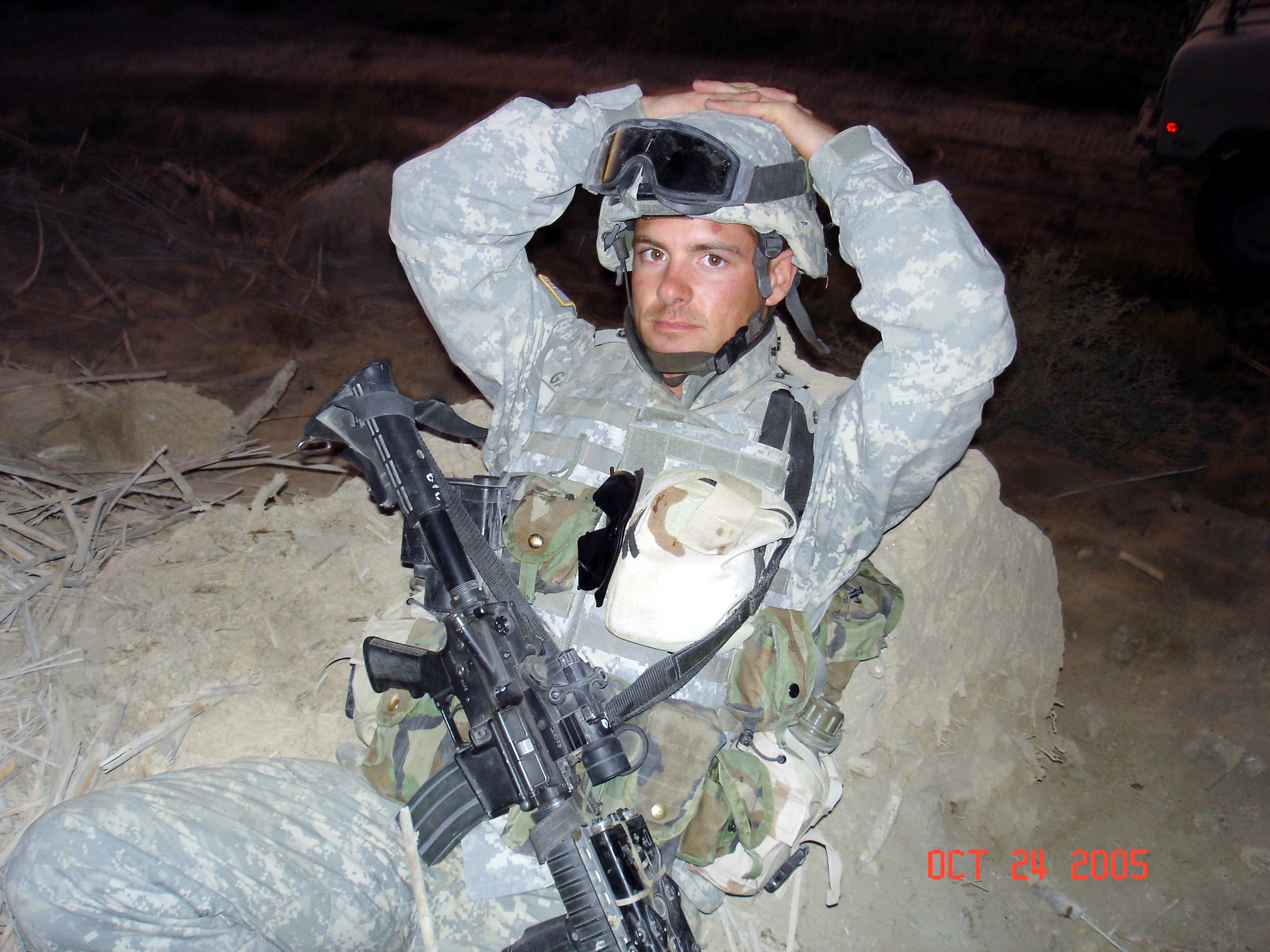
Tell me about your family.
I have three sisters. We are all close. We grew up not having a lot of money. I tell my mom that I’m impressed because we all turned out real good. I was the one most likely to screw up, but aside from me, my sisters are so successful and doing so well. Two of them are teachers, and my other sister manages a Walmart.
My dad lost his hand he was 18. He was working in a plant and a machine malfunctioned and squashed his hand. It was years before he met my mom. So I’ve never seen him with two hands, he doesn’t wear a prosthetic, and he’s always done construction work.
My mom is this little woman with white hair and you see her and you’re like “what a sweet little lady” but she has this side to her that she’s very direct and you think “I’m not going to cross this woman.”
When I was in the hospital and kind of depressed my mom made a comment to me one day, “You just had to outdo your dad and lose your arm and your leg.”And we laughed about it, but it was one of those moments when I needed to hear someone just straight up making a joke of it, and to remind me of what my daddy had gone through. Then I remember, it was very emotional when she said, “I’ve got to go back to Alabama. I’m not doing you any good, I’m helping you too much; you have to do more for yourself.” Well, she left, and then my dad was doing everything for me to the point where I said, “Dad, you have to leave, because I’m not going to get better.” It was such a sweet thing. He was so worried about me he was babying me in a way he had never done before.
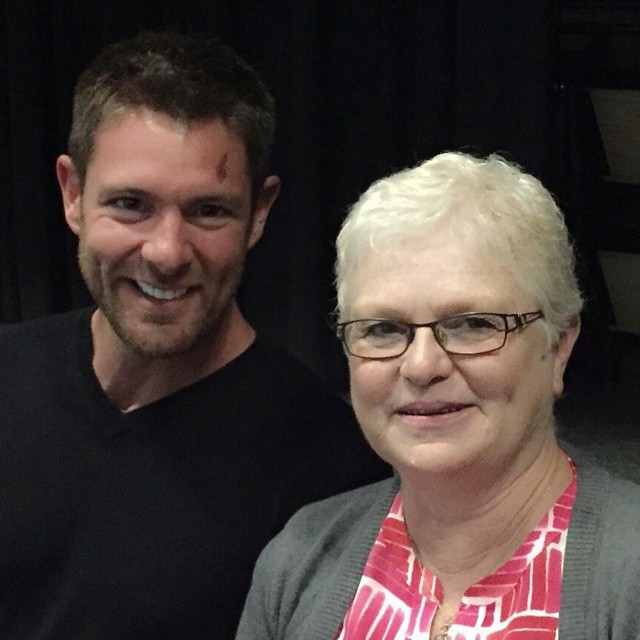
What about your heritage?
My grandfather was of Scottish descent and my grandmother Flynn was of Irish descent. My grandfather was Baptist and my grandmother was Catholic, and I always tell people that what you get when you bring those two countries and those two religions together is pure perfection.
How do people react to your prosthetics?
Kids will ask the questions adults are afraid of. It takes a little while for adults to ease in. Kids are hilarious. They will spot me across the room and they just want to know about my arm and leg. Yesterday I was at the gym and this boy who couldn’t have been more than five years old came up to me and said, “Hey Mr. Noah, I saw you on the dancing show” and then he walked away and then he came right at me and gave me a big hug, and said, “You did good at dancing.”
Tell me about your “No Excuses” fund.
I have three kids of my own so kids are so special to me. My fund raises money to reduce childhood obesity in the state of
Alabama and to empower injured veterans. We sponsor kids whose families don’t have the means, so that they can play games at the local YMCA, and we encourage eating healthy. I got into fitness very young and it got me through a lot in my life. I could walk into the gym with a bad attitude or upset and I always left in a good mood. So I think, introducing these kids to fitness may help them one day down the road.
And I support Operation Enduring Warrior (OEW) because it’s brought in so many injured guys. If you want to do the races you have to start getting into shape, and if you start getting into shape you’re less likely to over medicate or self medicate with alcohol because it affects your workout. So it causes this positive change in your life.
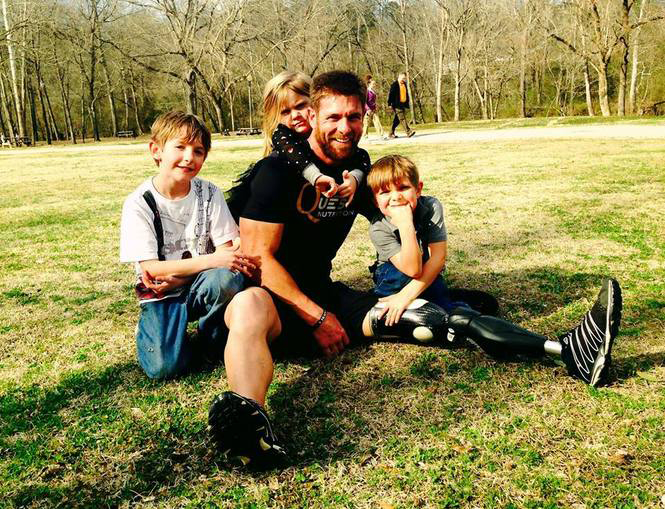
How did you become involved with Operation Enduring Warrior?
OEW were taking injured guys to events and honoring them. So when they contacted me, I thought it was nice, but I told them, “I don’t need a trip anywhere, I’m good.” Then they responded to me again and said, “You want to do a race with us don’t you?” I said, “I do.” I was the first
injured veteran to actually put on the mask and race with these other veterans. The mask cuts off 25 percent of your oxygen so you really have to be fit, and it signifies the challenges wounded veterans go through.
Can we do more for veterans?
There’s so many great organizations out there that are constantly trying to do things for veterans, and the main thing I hear is that many veterans get home and close themselves off and so it’s hard for these organizations to find them – to see what they need – and that makes it a challenge.
After I made the cover of Men’s Health, I had veterans reach out to me and thank me for being a positive image of veterans. I realized, there’s not enough of that being shown to the American public; that there are veterans out there who are moving forward – they have struggles but they keep pushing through. And I honestly feel that the more positive stories that are out there will motivate other veterans to get going.
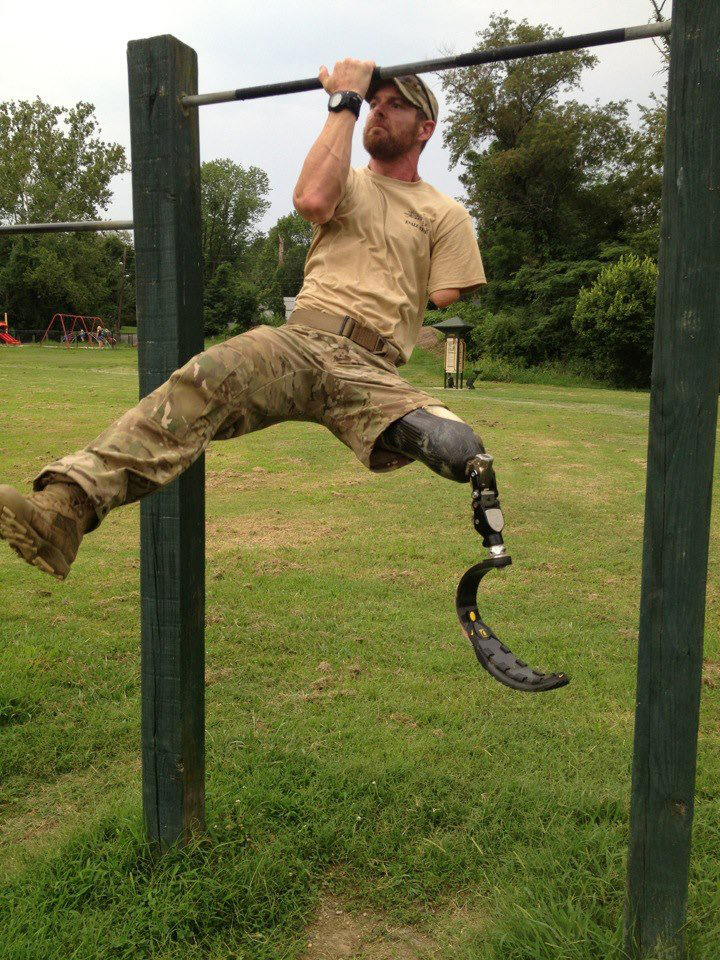
How did you get back in shape?
It was extremely challenging for me because I was in the worst shape I’d ever been. I found a 24-hour gym so I could go in at two or three in the morning so nobody was there – and the biggest struggle was – there was no book – no magazine, there was nothing online that told me how to work out missing an arm and a leg. So I had to figure it out. For the first week or two I was in the gym, I was just messing with the equipment, seeing what worked, and I eventually discovered that I could take an ankle strap and hook it to my residual limb on my arm, and use a cable machine – and work my chest – work my shoulder – work my back – and I could do the same thing with my leg through my prosthetic. Then I figured out that I was able to work my left side separate from my right side, and that was exciting. And the fact that I’ve been able to help other people out, and say “Hey, this is what works for me” is incredible.
So what’s your message to veterans and others who want to get in shape?
It takes work. And you have to find something that is your motivation, and for me it was my children. I realized I was not being a good role model. And I needed to change that. And so whenever I wanted to give up, I had to think, no, they’re more important than me. My depression was me being very selfish and I could not be selfish and be a good father. So that’s what I had to tell myself. I had to be constantly convincing myself – this depression was me having a pity party, and I had to pull myself out of it. And what I tell a lot of veterans is: “We can never forget that we’re still soldiers, sailors, airmen, and marines. We are men and women who were brave enough to wear the uniform, willing to go to combat – we’re willing to do that, to sacrifice and risk our lives for the country, it is not that big of a challenge to get home and to keep moving forward and to improve yourself every day. Because sometimes we forget that. I know I did. I forgot it and I remind myself, I’m still a soldier; I’m just on a different mission now.
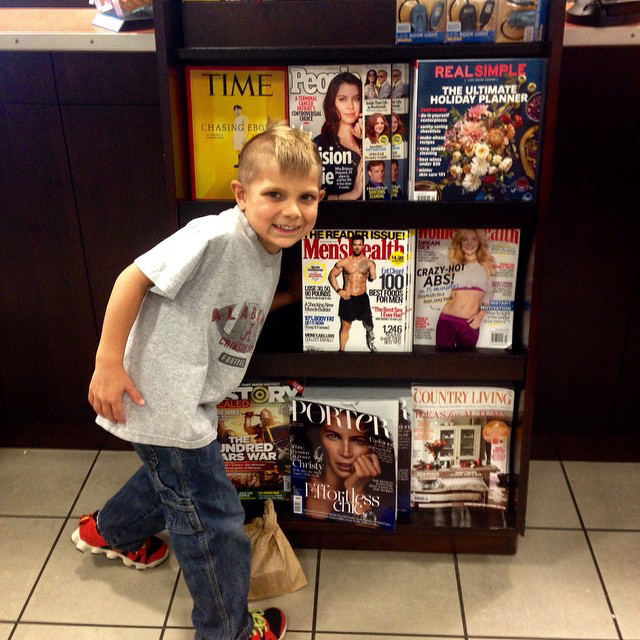
Tell me about your tattoos.
I have one tattoo on my right arm that’s from before I was injured. All of the others have been since I was injured. I’ve got one that represents the platoon I was in – it has a triangle behind it because we were in the triangle of death, and I have a mark for every friend of mine that I lost. And I have these different symbols that have these different little stories behind them, but what I want to ultimately do is, I want to finish my tattoos and I want the whole left side covered. And I have this idea that I want it so the bottom half is like a machine – but it’s a machine that is turning into a plant that’s wrapping around my body, and it’s constantly growing and changing because, this sounds funny to say out loud, but I treat my body like it’s a machine. It’s a well-oiled machine that I want to take care of – and always push it to the limits. But within life you’re always growing and changing, and that’s where the top half would be like this plant. I have this thought in my head, but I haven’t had the time to go and get a tattoo artist who could really draw it up and finish it. That’s one thing I want to do. ♦
_______________
To learn more about Noah’s No Excuses Fund visit: noahgalloway.com/charity


Leave a Reply